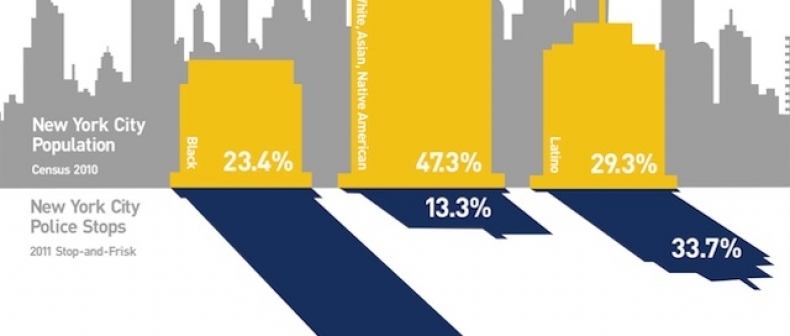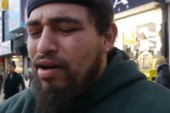
Credit: New York Civil Liberties Union
Twenty-three year old Nicholas Peart was leaving his grandmother’s house in Flatbush, Brooklyn, when three plainclothes policemen emerged from an unmarked squad car and approached him. The officers then ordered the young black college student to put his hands against the garage door and proceeded to physically search him, thumbing through his wallet before ultimately letting him go. It would be one of five times that year he had been stopped, and on all occasions he was found completely innocent of any crime. It seemed, as one officer told him, he just “fit the description.”
Peart is merely one of millions of New Yorkers in the past few years alone who have been similar targets of the NYPD’s controversial “stop and frisk” policy. Under the policy, which bases its constitutionality on a 1968 Supreme Court ruling, officers are allowed to question and search any individual they deem to be acting suspiciously, as long as they have reasonable cause. But as more and more stops occur every year, there are growing concerns that the “stop and frisk” has led to racial discrimination and abuses of power by an NYPD that has a history of both.
The policy is not without its supporters though, as Police Commissioner Ray Kelly has hailed it an “important tool” in stopping crime, and under his tenure the use of “stop and frisk” has increased by over 600 per cent. However, there are swaths of critics that include the New York Civil Liberty Union (NYCLU) and Center for Constitutional Rights (CCR), who say it is nothing more than an affront to citizen’s rights and a clear case of racial profiling. In more direct terms, they believe it is, to quote New York City Councilman Jumaane Williams: “bullshit.”
This heated debate over the policy has come to a head in Floyd et al. v. City of New York, a federal class action suit that seeks to expose the NYPD’s tactics as discriminatory and limit the use of “stop and frisk.”
Key to the trial is the expert testimony of Columbia Law Professor Jeffrey Fagan, whose recent analysis of the NYPD’s own data on the “stop and frisk” practices has seemed finally to prove what many communities across the five Burroughs have known for years. His study shows that for the vast majority of those subjected to the NYPD’s “stops”, only two things remain constant: they are innocent, and they are not white.
I talked with Professor Fagan over email, where he referred me to his work. In it, he details a number of statistics that suggest a serious racial bias in policing, as well as shedding light on the staggering number of people who are stopped each year. In addition to his analysis, the NYCLU also compiled a series of statistics about the “stop and frisk” practices that lends credence to the charges of racial bias:
- In 2011, 685,724 New Yorkers were stopped by the police, up from 601,285 in 2010.
- 605,328 were totally innocent (88 per cent).
- 350,743 were black (53 per cent of stops, relative to 23 per cent of the population).
- 223,740 were Latino (34 per cent of stops, relative to 29 per cent of the population).
- 61,805 were white (9 per cent of stops, relative to approximately 47 per cent of the population).
- 341,581 were aged 14-24 (51 per cent).
In addition to these stats, the study shows that out of those stopped only 0.15 per cent resulted in firearms charges. This number stands to directly contradict Commissioner Kelly’s statements that the stops are responsible for the fall in gun crime. Also of note is the fact that out of all ethnicities stopped, white people had the highest chance of having committed a crime, despite being proportionally the least searched.
But perhaps more damning than any of these statistics is the defense of city lawyers in Floyd et al. v. City of New York. In pre-trial statements they argued that while the success rate of the “stop and frisk” isn’t as high as one may desire, its efficacy lies in it being a useful deterrent against future crimes. It is a notion as ignorant as it is repulsive; that by the routine harassment of law abiding citizens, many of whom are young minorities, the police will instill a fear of authority strong enough to prevent criminality. Such reasoning is grossly unconstitutional, as the presiding federal judge was prescient to point out, and on a deeper level reeks of authoritarianism.
This isn’t the first time that ‘New York’s Finest’ have crossed over into such questionable territory under Commissioner Kelly, with a recent Pulitzer Prize winning series by the Associated Press having exposed NYC cops’ practice of spying on thousands of Muslim citizens without any probable cause. Such instances are what rights groups point to as a systemic racism problem in the police department, one that turns minorities into second class citizens, and instills a deep distrust of authority.
In coming months, the terms of Floyd et al. v. City of New York will be set and a landmark trial will begin. In court, a federal judge will hear testimony from a wide variety of individuals, including the aforementioned Peart and Fagan, as well as Senator Eric Adams, himself a former New York Police Captain. If successful, the suit will rein in the use of the “stop and frisk” and force the NYPD to adopt new tactics, possibly including alternatives that have been effective at targeting gun violence in other American cities.
The outcome of the trial may also set an important precedent to quell the recent resurgence of racial profiling by police forces in places like Germany, (who should really know better), and indeed even Toronto, where a 2010 investigation found that a black person is three times more likely to be questioned by police than their white counterpart.
While a victory for the plaintiffs in this case would hardly be a panacea to issues between minorities and police, it would, however, be one step closer to making the NYPD accountable for their actions and honour their commitment to “Courtesy, Professionalism, and Respect” for all citizens of New York, regardless of race.
_____
Nick Robins-Early is a freelance journalist currently based in Washington, D.C. Follow him @nickrobinsearly.
For more, follow us on Twitter at @torontostandard and subscribe to our newsletter.














